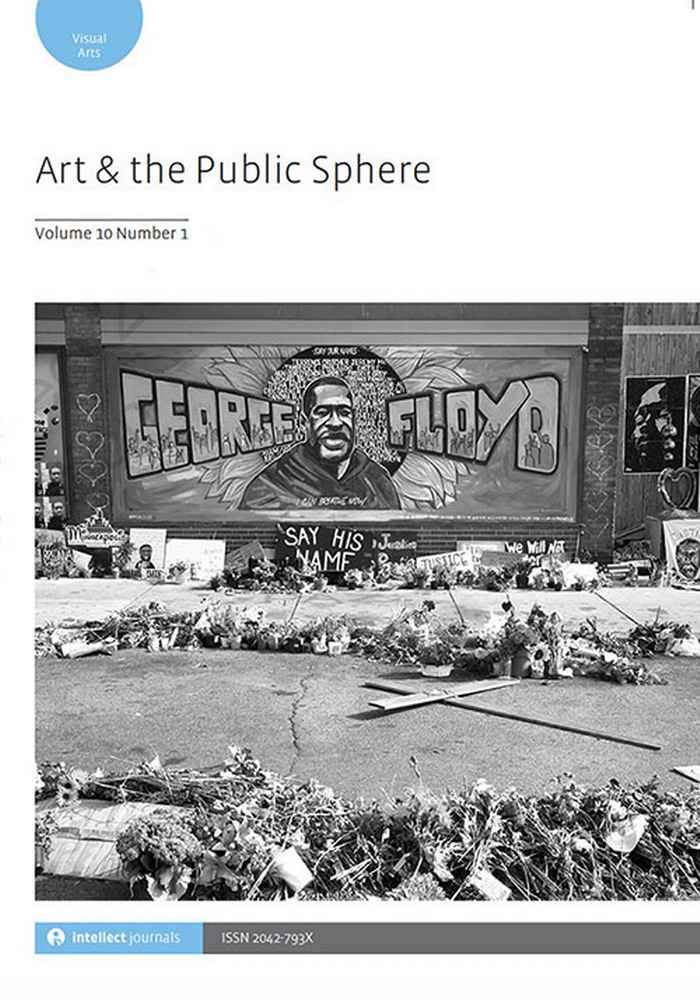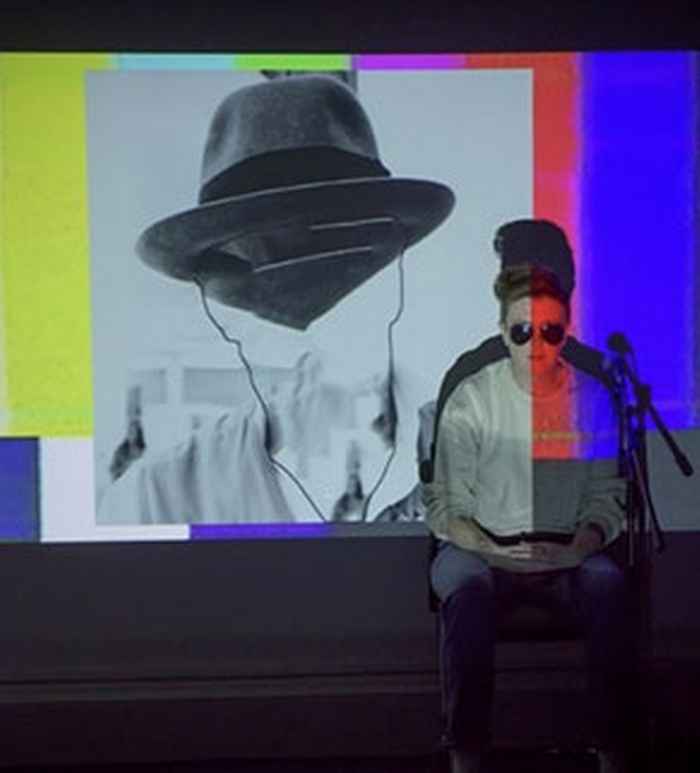Artistic Knowing: Research in and on Art and Cultural Practices
Cover image: Brian O'Doherty/Patrick Ireland, Art Since 1945, paint on wood, 1975-2018, image courtesy the artist and Simone Subal Gallery, New York.
Description of the research group
The currently dominant perspective on knowledge departs from cognitive paradigms of reasoning and the legacy of the positivist tradition. To thoroughly understand (through) artistic and cultural practices, traditional knowledge dimensions should be complemented by new, not only discursive but also non-discursive dimensions that are closer to the nature of artistic practices - such as for instance emotional dimensions of knowledge - and are more sensitive to the dynamics and the variety of the meanings of culture.
The group aims to pool multi-disciplinary expertise in and on Artistic Research (or better: Art Research) in the Amsterdam School for Heritage, Memory and Material Culture, and beyond. Artistic Research is at home in our Research Masters Art and Performance Research and this has attracted many PhD students to the UvA, collaborations with cultural institutions, museums and heritage sites.
However, there are also fields of expertise, where practice plays an increasing role and where it is less often theorised, reflected upon, or connected with existing Artistic Research discourses. This is true for some Archaeologists or Conservation and Restoration researchers, Educators or Curators – as well as artists with research questions that reach beyond disciplinary boundaries. We wish to further the debate of what research with a practice element more broadly can contribute to the more central concerns of the respective disciplines – and cultural (political) debates in general. As such, this group complements other initiatives, most notably ARRG, a long-standing forum for artists sharing their artistic research work housed at ASCA. It is (partly) focused on its place of work, the UvA’s Amsterdam city centre campus, notably comprising the curators, art historians and other custodians of buildings, venues and public space there gathered in the Kunstcommissie.
However, it reaches out far beyond the geographical limits of Amsterdam and the Netherlands, creating a melting pot for an international community of expertise and practice. The group sees itself as building bridges under the umbrella of ARIAS, sharing its aims – and contributing to creative and academic endeavours at the UvA, in Amsterdam and beyond. The Institute of Advanced Studies at the UvA is, with its ArtScience theme, artist-in-residence, cross-Faculty / international exchange and related programming, a particularly important partner for this group’s activities.
-
Spatial Practices in Art and Architecture for Empathetic Exchange (SPACEX), MSCA Horizon 2020, European Funding for Research and Innovation: RISE
UvA PIs: Christa-Maria Lerm Hayes, Francesco Chiaravalloti
Spatial Practices in Art and ArChitecture for Empathetic EXchange (SPACEX) is a transdisciplinary research action that utilises secondments between academic institutions and third sector organisations in order to scope and map European spatial practices. It provides a body of findings that can be easily accessed by commissioning agencies, policy makers and publics through its open source web-site (spacex-rise.eu). SPACEX aims to test, map, analyse, communicate and maximize the ways in which spatial practices in art, architecture and design instigate public exchange and promote empathetic ways of living together in urban space. It responds to the troubling rise of populist nationalism and conflict in European societies by engaging new publics and forging a culture that embraces diversity, difference, and discursive exchange within cities, towns and urban sites. The lack of interdisciplinary knowledge by those working in the cultural sector has significantly affected the way in which the social benefit of cultural activities is understood, articulated and applied. SPACEX proposes that inventing new and inclusive ways of living together, requires the implementation of new transdisciplinary and cross-sectoral practices and methods, that connect spatial practice with cultural sociology, cultural policy, critical pedagogies and behavioural economics. The comprehensive transdisciplinary composition of the SPACEX consortium – 27 partners in 9 EU countries and 1 TC, Palestine – will enable its ERs and ESRs to undertake secondments in a range of world-renowned academic institutions, research institutes, arts organizations, biennials, urban agencies, a film festival and a creative media agency.
Research Questions:
How do spatial practices effect public exchange and opinion formation in urban spaces, and enable more empathetic and inclusive ways of living together? (WPs 2, 3&4)
Additional Research Questions:
(1) How can transdisciplinary and cross-sector research methodologies help us better analyse and understand the role that spatial practices play in re-invigorating democratic processes within civil society? (W2)
(2) In what ways can the new knowledge generated through the SPACEX action shape future spatial practices as well as cultural and social policy and the practice of urban planning to promote inclusionary practices? (WPs2&3)
(3) How do the pedagogic strategies employed by spatial practices effect and contribute to the transformation and construction of subjectivity? What forms of knowledge are produced, and what types of subjects are supported? (WP3)
(4) What role does the archive play in understanding how historical and concurrent spatial practices address issues of democratic exchange and conflict? What are the limitations of extant archiving models and how can the archive be reimagined and reconfigured as a common, centralised shared resource? (WP4)Publication:

-
Research / Art / Writing

Emma Wolf-Haugh, Poverty of Vision, performance with audio/video 39’30’’, 2017, photo courtesy Louis Haugh Book Series with Brill Publishers, Leiden
Editor-in-Chief: Christa-Maria Lerm Hayes (University of Amsterdam)
Editorial Board: James Elkins (School of the Art Institute, Chicago), Maria Fusco (University of Dundee), Amelia Groom (Royal Danish Academy of Fine Arts, Copenhagen), Hilde Van Gelder (University of Leuven)
Advisory Board: Burcu Dogramaci (Ludwig Maximilian University, Munich), Darby English (University of Chicago), Sarat Maharaj (Lund University), Jalal Toufic (Hong Kong Baptist University)Research / Art / Writing (RAW) aims to promote critical, discursive, and creative engagement with global contemporary art and visual cultures. RAW understands contemporary art as an expanded field of practice, supporting experimental and interdisciplinary writing. We wish to provide a home for exciting, necessary, progressive work. We encourage personal approaches combined with articulated methodologies. We are interested in experimental art research: texts that account for positionality, pursuing art’s socio-political effects, while proposing rigorous answers to the question of matching form and content. RAW invites scholarly and artistic researchers to pursue insights into art’s multiple, including indirect, efficacies. The book series seeks analysis, documentation and discussion of, as well as intervention in, art’s actors and institutions. RAW investigates roles and potentialities of art for social transformation, instituting, and re-conceiving worlds to come.
For more information please contact Christa-Maria Lerm Hayes (c.m.lermhayes@uva.nl). Call for manuscripts: This peer reviewed, full-colour book series invites proposals for English language monographs, edited volumes, and other book forms. For more information contact Liesbeth Hugenholtz, Acquisitions Editor Art & Architecture at Brill (liesbeth.hugenholtz@brill.com). -
Postgraduate Network for the Study of Art Historiography (PNSA)
Methods of art history, just like pictures, can be dated. This is by no means a depreciation of pictures of methods – just a banal historical statement.
F. AntalSeveral art historians have signalled the problematics lying beneath the very foundations of art history since the late 1980s. This was arguably the result of Marxist, feminist and postcolonial interventions in art history, as experienced in all fields of the Humanities after 1968. However, the most substantial blow to art history came from within, with the return of the idea of Bildwissenschaft, which has its roots in the work of Aby Warburg (important to Memory Studies as practiced in AHM) and culminated in Visual Studies. Art History is fascinated with its past and current conundrums, and several art historians have raised the possibility of giving art-historical writing new directions and sought experimental and interdisciplinary ways of writing about art. This research group follows this strand of thought and investigates alternative and creative ways of looking at art history, which questions arising concerning such issues as neutrality, objectivity, and historical distance. The group will particularly foster fresh approaches to modern and contemporary art history, positing a creative art history.This group is led by Mehmet Berkay Sülek, PhD researcher with Christa-Maria Lerm Hayes.
-
Kunstcommissie
Samenwerking kunst, cultuur en wetenschap in het Universiteitskwartier en de binnenstad van Amsterdam
Kunst verbindt, verdiept en brengt reflectie in de samenleving. We willen onze deuren openstellen en expertise (laten) gebruiken om met elkaar, in academische context voor zowel studenten als een breed publiek de verbanden van kunst en wetenschap te laten zien. Met zorgvuldig samengestelde activiteiten en ontmoetingsgelegenheden zorgen wij voor een leefbaar cultureel klimaat in de binnenstad van Amsterdam. Wij zijn een samenwerking van partijen in het Universiteitskwartier voor Kunst, Cultuur en Onderzoek. Het Universiteitskwartier, Amsterdams oudste creatieve stadskwartier en onderwijshub, is een gebied in ontwikkeling. Het gebied kent een enorme rijkdom aan kunst, cultuur en wetenschapsinstituten, waaronder de Faculteit der Geesteswetenschappen van de Universiteit van Amsterdam, het Allard Pierson Museum, het Institute for Advanced Studies en de Akademie van Kunsten van de Koninklijke Akademie Nederlandse van Wetenschappen (KNAW), met nauwe samenwerkingsverbanden met het Amsterdam Museum, Stedelijk Museum, de Rijksakademie, De Appel en galeries en culturele instellingen in de omgeving. In de kunst en cultuursector gespecialiseerde academici van de UvA dragen bij aan een perfecte mix van vooruitstrevende partijen, die werken op het snijvlak van kunst en wetenschap voor een rijke inhoud. Door informatie uit te wisselen willen we programmering en beleid beter op elkaar afstemmen en nieuwe samenwerkingen mogelijk maken, zodat we via ons open netwerk diverse en inclusieve doelgroepen bereiken. We leveren bijdragen aan:
- ruimte voor een creatieve en academisch betrokken binnenstad;
- creatief academisch werk en nieuwe vormen van visualisatie voor impact van onderzoek en een breder publiek;
- brengen van kunst en cultuur in het publieke domein op het Universiteitskwartier.
Partners
Allard Pierson
Amsterdam Museum
ARIAS
Conservation and Restoration of Cultural Heritage
Facility Services (FS)
Huisvestingsontwikkeling (HO)
Humanities in Context (HiC)
Humanities Lab AVS
Institute of Advanced Study (IAS)
KNAW
Kunstgeschiedenis
Placemaking Faculty of Humanities
Onderzoeksgebouw Bushuis
SPUI25; Universiteitstheater
VOX-POP
et al - Publications
Societal relevance
Art(istic) Research includes methods such as exhibiting, performing and various other ways of communicating academic research to wider publics. It is, therefore, viewing societal impact as integral, not an added benefit. Many of society’s urgent debates, such as those on issues of social and environmental justice, use art as their method, means of (science) communication and arena. For the context in which we operate in this regard, see e.g. https://routekunstnwa.nl/nl/informatie. Through a strategic enabling of Artistic Research, direct and indirect forms of efficacy can evolve - and positional, indigenous voices and their often more poetic modes of enunciation can be heard. The group programmatically includes social scientists and those studying organisations, in order to make a step-change concerning (perceptions surrounding) the value of artistic knowing among the broader public.
Research Group Type: Network & Project group
Duration: 2021-2025
Group Coordinators
Members of the research group
Academic members UvA
Dr. Paula Albuquerque
PhD Candidate Benoit Antille
Prof. Dr. Julia Kursell
Dr. Christian Olesen
Dr. Sanneke Stigter
Dr. Colin Sterling
PhD Candidate Matthew Rana
PhD Candidate Mehmet Sülek
Prof. Dr. Alice Twemlow
PhD Candidate Elsbeth Veldpape
External members
Dr. Fabiola Camuti (ArtEZ University of Arts)
Dr. John Johnston (ArtEZ University of Arts)
Dr. Laura Cull Ó Maoilearca (Amsterdam University of the Arts)
Dr. Jeroen Lutters (ArtEZ University of Arts)
Dr. Martin Piber (University of Innsbruck)
Dr. Karen Wise (The Guildhall School of Music & Drama, London)
Dr. Toby Young (The Guildhall School of Music & Drama, London)
Dr. Tasos Zembylas (mdw - University of Music and Performing Arts Vienna)